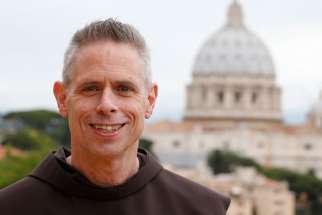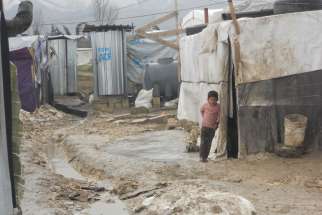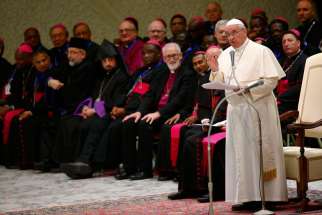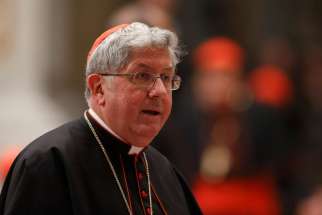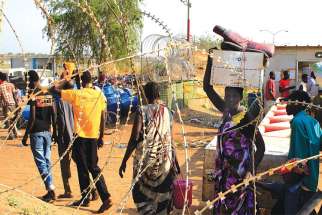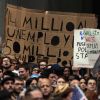An influential Franciscan order re-elected its American leader Thursday (May 21), just months after some of its members were accused of embezzling tens of millions of dollars.
Freezing temps, 60-mph winds, tents: Refugees struggle in Bekaa Valley
BEKAA VALLEY, Lebanon - Many Lebanese have spent as much time as possible indoors this winter, protecting themselves from this year's unusually brutal cold season.
Pope Francis faces a big week in his effort to reform the Vatican
VATICAN CITY - Pope Francis began what could be a key week for his reformist papacy Feb. 9, starting with meetings with his hand-picked kitchen cabinet of nine senior cardinals who are developing plans to overhaul the Roman Curia, the papal civil service that has been plagued with crisis and dysfunction.
OTTAWA - In a time of severe crisis around the world, Parliamentarians must show integrity and humility in public life, said Cardinal Thomas Collins.
A Christian solution to crisis
The world’s environmental crisis reflects a global spiritual crisis, and saving the planet requires a return to a world view centred around God, argues the director of the ecumenical Green Church program in Canada
Help restore dignity to South Sudan
Aid groups gather in Beirut to discuss Syrian refugee crisis
BEIRUT - Representatives of 26 humanitarian agencies gathered in Beirut to discuss and coordinate efforts to address the increasing Syrian refugee crisis.
Cardinal Robert Sarah, president of the Pontifical Council Cor Unum, who visited with Syrian refugees in the Bekaa Valley, presided over the Nov. 9 meeting.
During the cardinal's Nov. 6-10 visit, he also met with Lebanese President Michel Sleiman and participated in the monthly meeting of the council of Maronite Catholic bishops in Bkerke.
At the meeting sponsored by Caritas, the church's charitable agency, the humanitarian organizations agreed to carry out social work for the vulnerable populations inside and outside of Syria, to help alleviate their suffering, including providing medical and spiritual assistance as well as helping them to find shelter and prepare for the winter.
The groups also agreed to institute an efficient coordination system among the Catholic humanitarian organizations to unify their approach on the field.
They also stressed the importance of efforts to allow refugee children to continue their education and to recover some kind of routine in their daily lives.
Pope Benedict XVI had hoped to send a delegation of three cardinals, three bishops and a priest to Syria during the world Synod of Bishops, which met for three weeks at the Vatican in October, to show solidarity with victims and encourage peace negotiations. The papal delegation to Damascus was to have included Cardinal Timothy M. Dolan of New York, chairman of the board of the Catholic Near East Welfare Association.
Pope Benedict announced Nov. 7 that he would send Cardinal Sarah to Lebanon to deliver a $1 million donation and boost the church's humanitarian response to the crisis.
Syria's civil war has left thousands dead and has displaced hundreds of thousands of people since March 2011.
The U.N. refugee agency said Nov. 9 that a record number of Syrian refuges had crossed into Turkey, Lebanon and Jordan, setting a record for a 24-hour period.
The majority -- reportedly 9,000 Syrians -- had crossed into Turkey's Urfa province during the night Nov. 8, said the U.N. High Commissioner for Refugees.
The remaining 2,000 Syrians were registered and assisted by UNHCR in Jordan and Lebanon, the agency said.
Those arrivals bring the number of Syrian refugees in the region to 408,000, the UNHCR said, but the numbers are actually greater because not all of the displaced Syrians entering the countries are registering with the agency.
It said about 115,000 Syrian refugees live in Lebanon. It said approximately 1,000 entering the country daily, including migrant workers who go back and forth between Lebanon and Syria.
Economic crisis will bring more suffering, bishops told
Ste. Adele, Que. - In the midst of the worst economic crisis in decades, "there is no miracle cure," a Montreal-based economist told the Canadian bishops Sept. 25.
Governments do not have much leeway to help those affected, though economies that are more flexible will suffer less, Pierre Piché, an expert in international investment and advisor to the Power Corporation of Canada, told the Canadian Conference of Catholic Bishops annual plenary.
“There is not much choice,” Piché told the gathering of more than 90 Canadian bishops. “Either we suffer or we need to adjust. We’re going to suffer even if we adjust.”
The crisis affects the whole world economy, especially its key engines: North America, Europe and Japan.
“It goes really bad when you’re on a plane and you have three of the four engines not working,” he said.
He gave a macro view of the problem through key indicators: unemployment that is more and more structural and composed of people who have been looking for work for a longer time than previously or have abandoned looking for work altogether; sluggish rates of growth; and rising government debt.
Piché said fears of inflation have been replaced by fear of deflation where prices go down in a generalized manner. This explains the behaviour of central banks in trying to pump money into the economy.
“Deflation is horrible,” he said. “It’s very serious because it changes the behaviour of people. When they know prices are going down, they won’t spend. It creates a vicious circle.”
Now there is a cycle where governments and individual households are rejecting a pattern of heavy indebtedness that preceded 2007, he said.
We’re facing what economist John Maynard Keynes called the “paradox of thrift,” he said, noting while it is good and ethically right for households and corporations to be thrifty, “if nobody consumes, then nobody sells anything and everyone goes broke.”
Fr. Bill Ryan of the Jesuit Forum for Social Faith and Justice in Toronto offered a theological reflection on the crisis, pointing out Pope Benedict XVI calls for the logic of profit to be replaced by the logic of gift “that is the opposite of putting a price on everything.”
At the basis is the right relationship we must develop between God and human, among humans and with creation, including a preferential option for the poor, Ryan said, stressing the “essential relationship between faith and justice and justice and evangelization.”
“The whole planet is our neighbourhood and in need of evangelization,” he said, noting the Pope’s social justice encyclical Caritas in Veritate also concerned itself with evangelizing and civilizing the global economy.
Faith and justice cannot be separated, nor can evangelization and justice, he stressed.
Ryan call a “new and global humanism” a “sign of the times,” saying the secular world is coming to a “growing consensus we need a new mindset.”
“Our models and tools are proving inadequate; we seem to be walking with no clear purpose,” he said.
Montreal Auxiliary Bishop Thomas Dowd said the “logic of the gift ties in with our preoccupation with the family.”
“The family is an economic unit, but its internal relations are supposed to be based on the logic of the gift,” he said. “You don’t have kids just because you want someone to look after you in your retirement.”
Families’ internal relationships are becoming “atomized,” he said, and less and less based on the logic of the gift, Dowd said.
“That’s the canary in the coal mine, a sign the whole thing is disordered.”
Ryan said it is important to not always look at big economic structures but at the problems of the small ones. One problem attacking families is the level of family debt which is higher in Canada than elsewhere.
“If we don’t have strength at the bottom,” needed values “won’t come into institutions,” he said.


